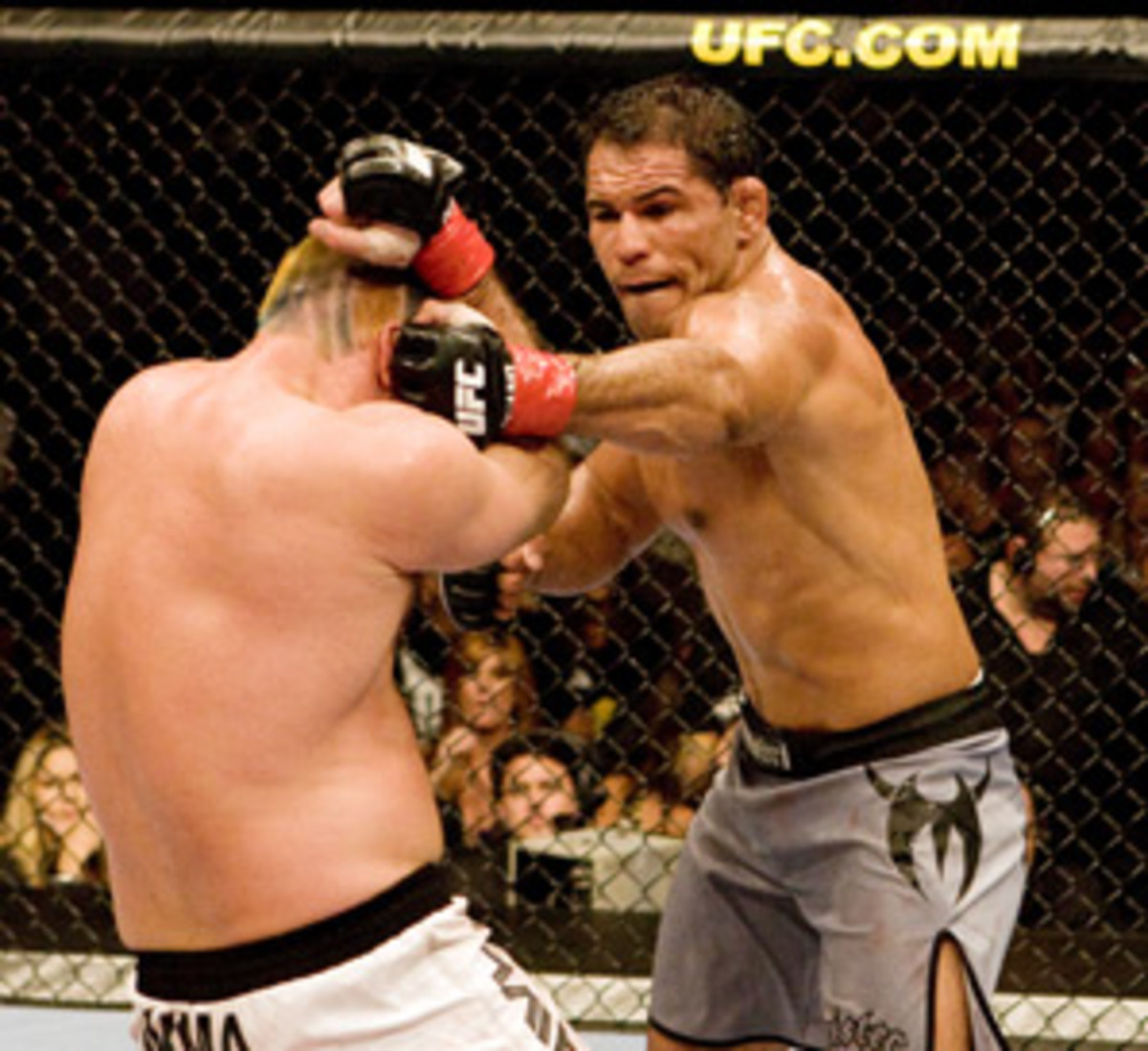Legacy at stake for 'Minotauro'
Combined, the two revered fighters, both nearing the end of their careers, represent a full picture of mixed martial arts -- one having helped raise American MMA from the dead; the other a regular participant in big-money fights in front of enormous Japanese crowds.
As their careers played out over 22 years and 63 fights, neither Couture nor Nogueira have much to complain about. Except, perhaps, timing. While each faces the reality of an emptying hourglass -- Couture is 46, Nogueira a war-torn 33 -- the pair will meet for the first time at UFC 102 knowing they could have as easily done the same eight years ago in their primes during a historic tournament that helped shape the sport.
Four months removed from recapturing the UFC heavyweight championship in 2000 against Kevin Randleman, Couture advanced into the semifinals of Japan's RINGS 32-man "King of Kings 2000" tournament, considered at the time the best heavyweight field ever assembled, before being upset by the talented but heady Valentijn Overeem.
Defeating Nogueira in the finals would have given Couture ownership of the title as MMA's best heavyweight just when Zuffa assumed control of the UFC. Instead, when Couture tapped to a guillotine and Nogueira secured an arm-triangle against Alistair Overeem's older brother, it was the jiu-jitsu pioneering Brazilian who walked away as the sport's top heavyweight -- thus signaling years of debate about the caliber of competition between U.S. and Japanese fight organizations.
No one could have known it then, but that loss, which gnaws at Couture's competitive soul, played a major role in the growth of Japanese MMA and its reputation from 2000 through 2006 for showcasing MMA's best heavyweights.
Few seemed capable of duplicating what Nogueira managed at his peak. At 235 pounds he moved with the grace of a middleweight, finishing fights by chokes no one had seen before and joint locks that inspired a generation of young jiu-jitsu players.
"I have been impressed with the kinetic chess match he brings to every single fight," said Couture. "He's certainly been one of the top guys in the sport."
Nogueira could also take a beating, making several of his fights and stories of his sturdiness legendary.
Sitting inside a closed hotel restaurant in Osaka, Japan, in 2001, Nogueira recounted a tale to me he would never stop telling. The scar on his back, by the looks of it something a knife or bullet might create, demanded the story. When Nogueira was 11, a truck slammed into him and continued down a dusty road near his Brazilian hometown. He was stuck underneath. Four days in a coma, 11 months in a hospital and the heavy price of one rib and a portion his liver were disregarded when he claimed recovery through martial arts. Later as a professional fighter, the 6-foot-3 "Minotauro" -- so named in honor of the mythical half-man, half-bull creature from Greek mythology -- often displayed the kind of guts that probably prevented his death as a child.
Less than three months after armbarring Coleman, Nogueira outpointed HeathHerring in front of 63,000 fans in the Tokyo Dome to win the first Pride heavyweight title. Back in the U.S., Couture used the same November weekend to trounce Pedro Rizzo, redeeming himself as undisputed UFC champion post-RINGS.
At that moment, Couture-Nogueira would have been a dream fight. UFC champ versus Pride champ, the top two heavyweights competing in MMA. Yet, everything soon went away when Josh Barnett stopped Couture (16-9) in 2002 and Nogueira succumbed to Fedor Emelianenko a year later. It's because of Emelianenko that Nogueira could never be considered the best heavyweight in MMA. For more than three years, Minotauro toiled behind the Russian, whom he lost to a second time in 2004. Couture, meanwhile, hopped back and forth between light heavyweight and heavyweight, winning titles in both divisions and gaining fame as MMA grew in popularity in the States.
As a result of the UFC winning its promotional war with Pride, Nogueira made his way to the U.S. two years ago. To American audiences just seeing him for the first time, the Brazilian appeared to be working underwater. Though he survived to win his first two bouts in the UFC, everything caught up to Nogueira last December against Frank Mir. Hardly a slugger, Mir delivered the first stoppage loss of Nogueira's career.
"It was very bad for me to fight this fight," said the submission specialist, who carries a record of 31-5-1 with him into the cage against Couture. "I couldn't move at all."
His left knee was terrible. Leading up to the fight it popped out place while he slept. And three weeks before the bout Nogueira was hospitalized for a bad staph infection.
Sometimes being tough isn't a positive attribute.
Eight months removed from the worst fight of his career, Nogueira's knee is surgically repaired. He and his camp claim he hasn't felt this good in four years. And a date with the scale in Portland, Ore., on Friday should reveal Nogueira around his ideal weight of 230 pounds.
"I feel like I have to perform way better than the last match," he said. "I [trained] way better than for my last match. I felt like I had to work more. My opponent is very good, very strategic."





